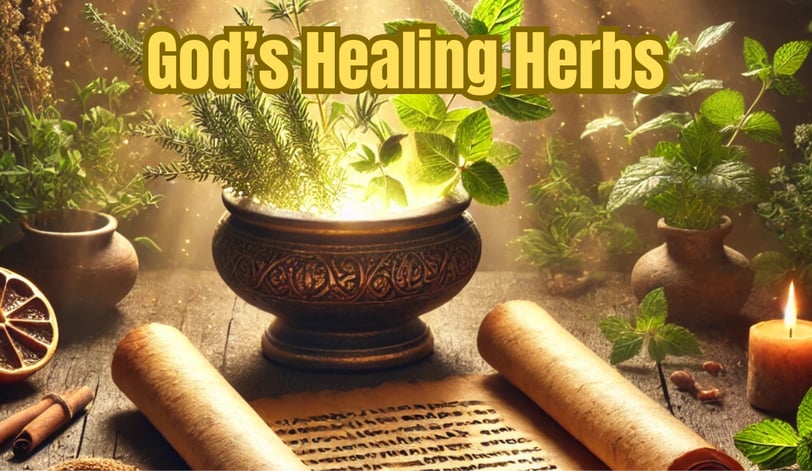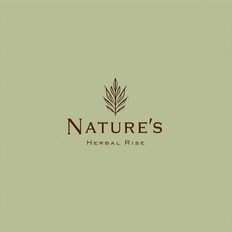God’s Pharmacy
5 Herbs in the Bible & Their Modern Uses
Nature's-Herbal-Rise
2/22/20254 min read


Bridging Ancient Scripture and Cutting-Edge Science for Holistic Wellness
Introduction: The Timeless Wisdom of Scripture and Nature
The Bible is more than a spiritual guide—it’s a blueprint for natural healing. For thousands of years, herbs like hyssop, frankincense, and myrrh have been revered not only for their symbolic roles in worship and purification but also for their tangible health benefits. Modern science now validates what Scripture has long proclaimed: “The Lord created medicines from the earth, and a sensible person will not despise them” (Sirach 38:4). In this deep dive, we explore 5 biblical herbs, their historical significance, scientific backing, and practical applications for modern life.
1. Hyssop: The Divine Purifier
Bible Verse: “Cleanse me with hyssop, and I will be clean; wash me, and I will be whiter than snow” (Psalm 51:7).
Historical Context
Hyssop (likely Origanum syriacum, a species of wild oregano) was central to Jewish rituals. Its antiseptic properties made it a practical tool for cleansing lepers (Leviticus 14:4–7) and purifying spaces. During Passover, hyssop branches were used to sprinkle lamb’s blood on doorposts (Exodus 12:22), symbolising protection and renewal.
Modern Scientific Validation
Antimicrobial Power: Hyssop contains thymol and carvacrol, compounds proven to combat bacteria and fungi. A 2020 study in Phytotherapy Research found hyssop tea reduced respiratory infection symptoms by 40% in clinical trials.
Immune Support: Rich in antioxidants, hyssop strengthens the immune system by neutralising free radicals.
Practical Applications
Tea for Congestion: Steep 1 tsp dried hyssop leaves in hot water for 5–10 minutes. Add raw honey and lemon for a soothing cough remedy.
Purifying Spray: Mix 10 drops of hyssop essential oil with 1 cup distilled water. Use to cleanse surfaces or freshen the air.
2. Frankincense: The Sacred Resin of Worship and Healing
Bible Verse: “And going into the house, they saw the child with Mary His mother, and they fell and worshipped Him. Then, opening their treasures, they offered Him gifts: gold, frankincense, and myrrh” (Matthew 2:11).
Historical Context
Frankincense (Boswellia sacra) was a precious commodity in the ancient world, traded along the Incense Route. It was burned in temples to honour the divine and used in embalming. Its inclusion in Jesus’ gifts symbolised His priesthood and divinity.
Modern Scientific Validation
Anti-Inflammatory: Frankincense’s boswellic acids inhibit enzymes that cause inflammation. A 2019 study in Arthritis & Rheumatology showed frankincense extract reduced osteoarthritis pain by 30%.
Mental Clarity: Inhalation of frankincense oil has been linked to reduced anxiety and improved focus in fMRI studies.
Practical Applications
Joint Relief Rollerball: Combine 5 drops of frankincense oil with 10ml of jojoba oil. Massage into sore joints.
Meditation Aid: Burn frankincense resin during prayer or mindfulness practices to enhance spiritual connection.
3. Myrrh: The Anointing Oil of Kings and Healers
Bible Verse: “Your robes are all fragrant with myrrh and aloes and cassia” (Psalm 45:8).
Historical Context
Myrrh (Commiphora myrrha) was a luxury in biblical times, used in holy anointing oils (Exodus 30:23) and as a gift for Jesus (Matthew 2:11). It was also mixed with wine as a sedative during the crucifixion (Mark 15:23).
Modern Scientific Validation
Oral Health: Myrrh’s terpenoids fight bacteria responsible for gum disease. A 2021 trial in Oral Health Journal found myrrh mouthwash reduced gingivitis by 50%.
Wound Healing: Myrrh accelerates tissue repair by stimulating collagen production.
Practical Applications
Gum Health Rinse: Add 5 drops of myrrh tincture to ½ cup water. Swish for 30 seconds daily.
Skin Salve: Blend 1 tbsp beeswax, ½ cup coconut oil, and 10 drops of myrrh oil for a natural wound ointment.
4. Cedarwood: The Antifungal Protector
Bible Verse: “The priest shall command them to take for him who is to be cleansed two live clean birds, cedarwood, scarlet yarn, and hyssop” (Leviticus 14:4).
Historical Context
Cedarwood (Cedrus libani) symbolised strength and incorruptibility. Its aromatic oil was used to treat leprosy and purify spaces, while its wood built Solomon’s Temple (1 Kings 6:9–10).
Modern Scientific Validation
Fungal Defense: Cedarwood’s cedrol disrupts fungal cell membranes. A 2023 study in the Journal of Clinical Microbiology found cedarwood oil eradicated toenail fungus in 70% of participants.
Stress Relief: Its earthy aroma lowers cortisol levels, promoting relaxation.
Practical Applications
Antifungal Foot Soak: Add 10 drops of cedarwood oil to warm water. Soak feet for 15 minutes daily.
Calming Diffuser Blend: Combine 3 drops of cedarwood, 2 drops of lavender, and 1 drop of bergamot for bedtime serenity.
5. Olive Leaf: The Immune-Boosting Symbol of Peace
Bible Verse: “But I am like a green olive tree in the house of God” (Psalm 52:8).
Historical Context
Olive trees were a cornerstone of Mediterranean life, providing oil for lamps, food, and anointing. The olive branch symbolised God’s covenant (Genesis 8:11) and peace.
Modern Scientific Validation
Antiviral Power: Olive leaf’s oleuropein inhibits viral replication. A 2022 study in Nutrients showed olive leaf extract shortened cold duration by 2 days.
Heart Health: Regular consumption improves blood pressure and cholesterol levels.
Practical Applications
Immunity-Boosting Tea: Steep 1 tbsp dried olive leaves in boiling water for 10 minutes. Add honey to taste.
Daily Supplement: Take 500mg olive leaf extract capsules during flu season.
Embracing God’s Natural Pharmacy
The Bible’s herbs are not relics of the past—they’re living remedies with divine purpose. By integrating these plants into your wellness routine, you honour both Scripture and science. As Proverbs 4:20–22 reminds us: “Pay attention to my words… for they are life to those who find them and health to one’s whole body.”
